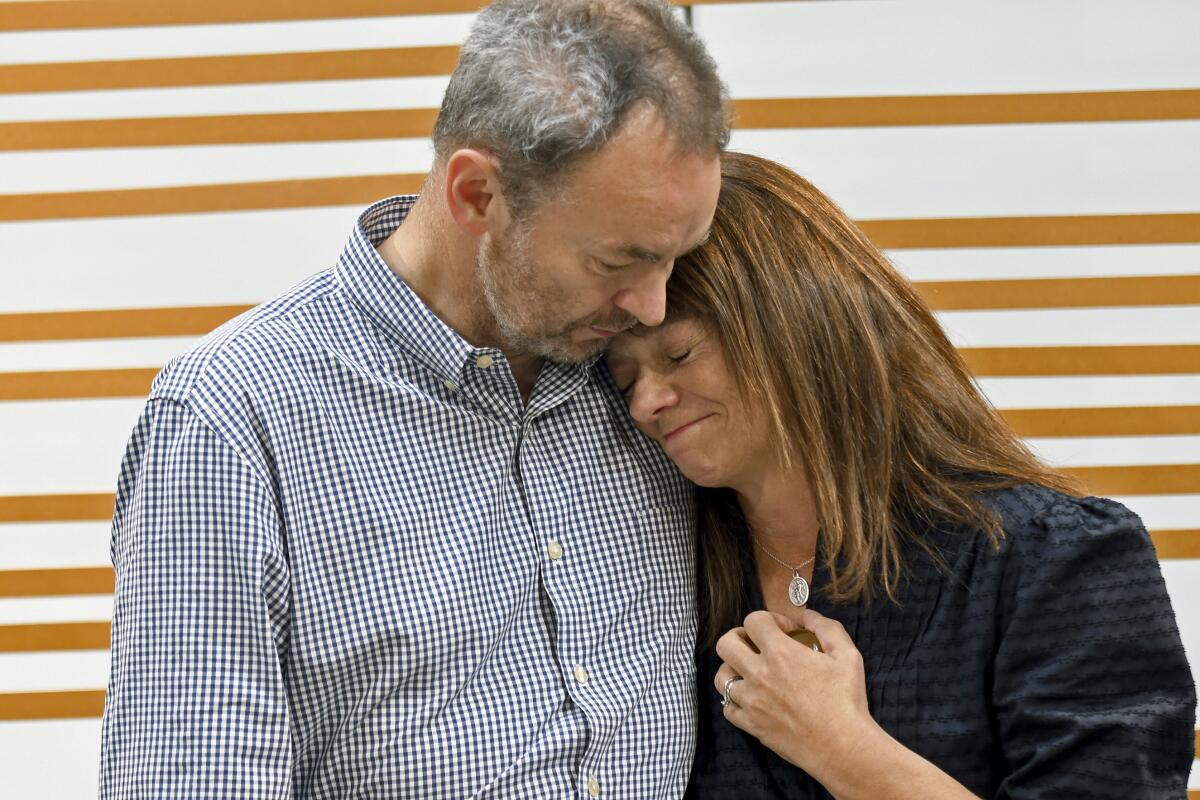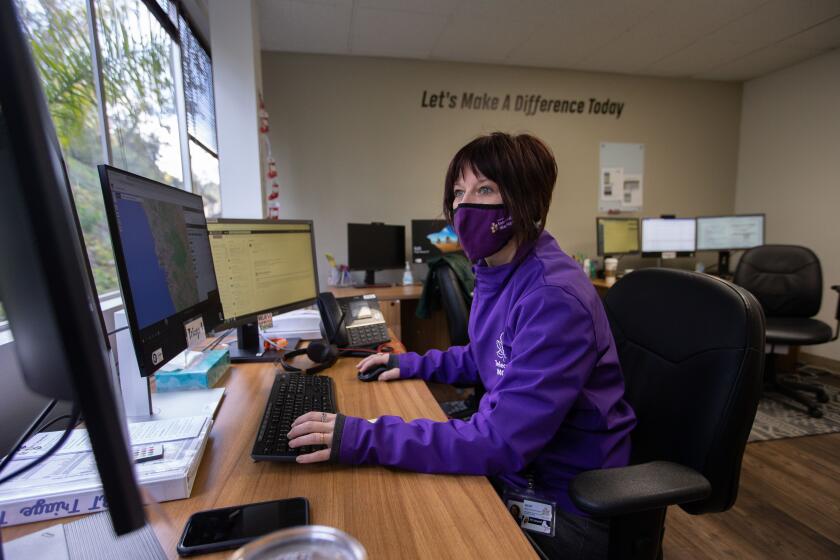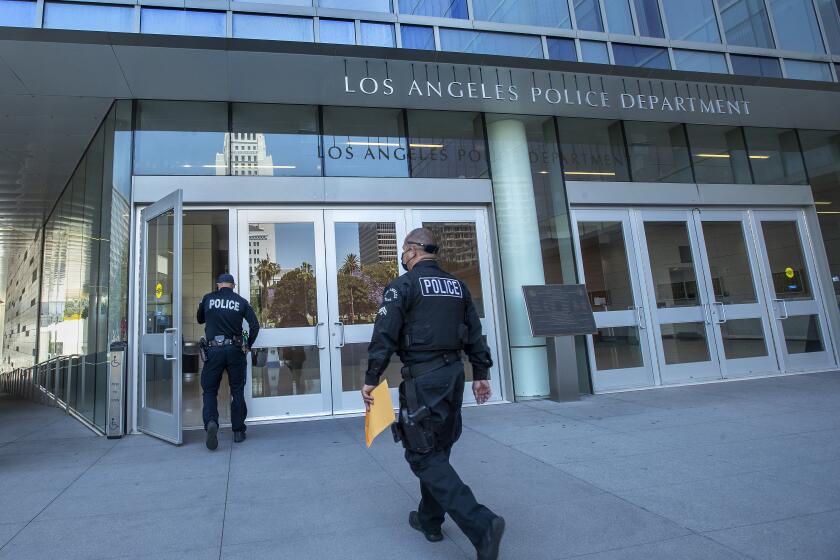Family of Colorado man killed by deputy during mental health crisis to receive $19 million

- Share via
DENVER — The parents of a 22-year-old Colorado man killed by a sheriff’s deputy while suffering a mental health crisis have won $19 million from government state and local agencies and spurred changes to how officers are trained, under a settlement announced Tuesday.
The shooting of Christian Glass after his SUV became stuck in the mountain town of Silver Plume last year drew national attention and prompted calls to reform how authorities respond to people with mental health problems.
As part of the settlement, Sally and Simon Glass also negotiated for changes that they hope will prevent another family from suffering a loss like theirs. Clear Creek County will establish a crisis response team and its sheriff’s office will train and certify all deputies in crisis intervention, according to documents released by their attorneys.
The state of Colorado, which had three officers on the scene of Glass’ June 11, 2022, killing, will create a virtual reality training scenario for the Colorado State Patrol based on the shooting that will focus on de-escalation in stressful situations involving officers from different agencies.
A video message from Simon and Sally Glass will also be shown to state troopers and Division of Gaming officers at the beginning of their active bystander training. The program focuses on encouraging officers to intervene if they think a fellow officer is going too far or needs to step away from an incident.
There was no indication from body-camera footage that officers from other agencies who were present at the scene attempted to stop the breach of the vehicle before Christian Glass was shot.
No guns, no badges, no sirens. The county’s Mobile Crisis Response Teams change how people in crisis receive mental health care.
An attorney for the Glasses, Siddhartha H. Rathod, said they hope hearing their story will help officers have the strength to intervene if necessary.
“Any of the seven officers there could have stopped this simply by saying something. They want to empower law enforcement to have this courage,” he said of the shooting.
The settlement, which the communities of Georgetown and Idaho Springs also joined, is the largest for a police killing in Colorado, topping the $15-million settlement reached in 2021 for the death of Elijah McClain, and also ranks among the top in the United States, Rathod said. His law firm also represented the mother of McClain, a 23-year-old Black man who died in 2019 after police in the Denver suburb of Aurora forcibly restrained him and a paramedic injected him with the powerful sedative ketamine.
Former Clear Creek County Sheriff’s Deputy Andrew Buen, who shot Glass, and his supervisor, former Sgt. Kyle Gould, are both being prosecuted in Christian Glass’ death. A grand jury found that they needlessly escalated the standoff after he called 911 for help. Gould was not at the scene but was watching events unfold on body-camera footage and authorized officers to remove Glass from his vehicle, according to court documents.
Growing up with a mom who’s a therapist taught me the surprising lesson that it’s OK to feel uncomfortable.
Lawyers for both officers unsuccessfully tried to get the charges against them thrown out. While Buen’s lawyer objected to how information was presented to the grand jury, Gould’s lawyer argued that Glass needed to be evaluated for drugs, alcohol and mental health problems and could not just be allowed to leave.
In response to police killings of people in mental distress, reformers have pushed for crisis intervention and de-escalation training for police and even alternative policing programs where mental health responders are sent to some emergency calls instead of law enforcement.
Some cities, including Denver, have programs where EMTs and mental health clinicians can be dispatched instead of police. But the area where Glass was killed, about an hour’s drive away from Denver, did not have that option at the time.
Glass, whose car became stuck on a dirt road, initially told the dispatcher that he was being followed and made other statements that the indictment said showed he was paranoid, hallucinating or delusional and experiencing a mental health crisis.
Start your day right
Sign up for Essential California for the L.A. Times biggest news, features and recommendations in your inbox six days a week.
You may occasionally receive promotional content from the Los Angeles Times.
Officers’ body-camera footage showed Glass refusing to get out of his car, making heart shapes with his hands to officers and praying: “Dear Lord, please, don’t let them break the window.”
After roughly an hour of negotiations, officers decided to breach the car even though there was no indication that Glass posed a danger or was suspected of a crime, according to the grand jury.
Once the window was smashed, body-camera footage shows officers peppering Glass with bean bag rounds, then Tasing him. Glass brandished a knife in “a state of complete panic and self-defense” before twisting in his seat to thrust a knife in an officer’s direction, according to the grand jury. Buen then fired his gun five times into Glass.
The grand jury found that at no point was the other officer in “imminent danger of being stabbed by Mr. Glass.”
The Los Angeles Police Department union wants to free up officers to tackle major crimes by no longer having them respond to less serious calls.
The indictment added: “But for the decision by Gould to remove Mr. Glass from the vehicle, there is no reason to believe that Mr. Glass would have been a danger to any law enforcement personnel, to himself, or to any member of the public.”
Body-camera footage doesn’t show officers from other agencies — including the Colorado State Patrol, Division of Gaming and police from the nearby towns of Idaho Springs and Georgetown — attempting to stop the breach of the vehicle.
When Glass’ parents first publicly called for accountability for their son’s death last year, Sally Glass said Christian was “petrified” the night he was killed and the officers had no empathy for him. She asked for people to pray for their son and for structural change in policing.
“They should be protecting us, not attacking us,” she said.
More to Read
Sign up for Essential California
The most important California stories and recommendations in your inbox every morning.
You may occasionally receive promotional content from the Los Angeles Times.













